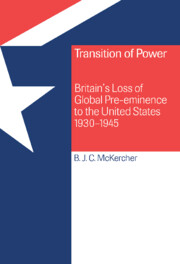Book contents
- Frontmatter
- Contents
- Acknowledgments
- List of abbreviations
- Prologue: Power and purpose in Anglo-American relations, 1919–1929
- 1 The end of Anglo-American naval rivalry, 1929–1930
- 2 The undermining of war debts and reparations, 1929–1932
- 3 Disarmament and security in Europe and the Far East, 1930–1932
- 4 The unravelling of co-operation, 1932–1933
- 5 Moving away from the United States, 1933–1934
- 6 Britain, the United States, and the global balance of power, 1934–1935
- 7 From Abyssinia to Brussels via London, Madrid, and Peking, 1935–1937
- 8 Appeasement, deterrence, and Anglo-American relations, 1938–1939
- 9 Belligerent Britain and the neutral United States, 1939–1941
- Epilogue: ‘A new order of things’, 1941–1945
- Select Bibliography
- Index
1 - The end of Anglo-American naval rivalry, 1929–1930
Published online by Cambridge University Press: 15 July 2009
- Frontmatter
- Contents
- Acknowledgments
- List of abbreviations
- Prologue: Power and purpose in Anglo-American relations, 1919–1929
- 1 The end of Anglo-American naval rivalry, 1929–1930
- 2 The undermining of war debts and reparations, 1929–1932
- 3 Disarmament and security in Europe and the Far East, 1930–1932
- 4 The unravelling of co-operation, 1932–1933
- 5 Moving away from the United States, 1933–1934
- 6 Britain, the United States, and the global balance of power, 1934–1935
- 7 From Abyssinia to Brussels via London, Madrid, and Peking, 1935–1937
- 8 Appeasement, deterrence, and Anglo-American relations, 1938–1939
- 9 Belligerent Britain and the neutral United States, 1939–1941
- Epilogue: ‘A new order of things’, 1941–1945
- Select Bibliography
- Index
Summary
[Hoover] is, it is generally understood here, much more interested in naval reduction and restriction which he regards as immediately feasible than in the ‘Freedom of the Seas’ which he is supposed to think will anyhow take a very long time to settle internationally with or by treaties or by conference.
Howard, June 1929Baldwin and the Conservatives lost the 30 May 1929 General Election and, although Labour lacked a majority in the House of Commons, MacDonald formed a government. Assured of Liberal support because of Lloyd George's antipathy towards Baldwin, the second Labour ministry took office on 7 June. Whilst the new prime minister had an abiding interest in foreign policy – serving as his own foreign secretary in 1924 – intra-party manoeuvring saw him offer the Foreign Office to his chief rival, Arthur Henderson, the party chairman. Yet, despite relinquishing the Foreign Office to Henderson, MacDonald retained control over Britain's American policy. Success here might strengthen the electoral appeal of the party and enhance his position as leader. Moreover, such a course flowed from his interest in Anglo-American relations and, importantly, his public posturing whilst leader of the Opposition after 1924. In terms of the former, he privately reproached American smugness: ‘[The United States] seems like one of our new rich families that put a heavy and vulgar foot upon our life, that have a big and open purse, but that even in its gifts and in its goodness has an attitude and a spirit that makes one's soul shrink up and shrivel.’ But because he was an atlanticist, removing Anglo-American differences became the focus of his thinking on foreign policy. This informed his utterances whilst in opposition.
- Type
- Chapter
- Information
- Transition of PowerBritain's Loss of Global Pre-eminence to the United States, 1930–1945, pp. 32 - 62Publisher: Cambridge University PressPrint publication year: 1999

